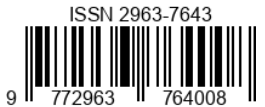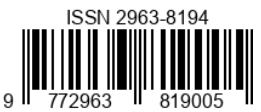Pengaruh Motivasi dan Disiplin Kerja terhadap Kinerja Pegawai
DOI:
https://doi.org/10.55606/jekombis.v3i4.4356Keywords:
Work Discipline, Employee Performance, MotivationAbstract
This study aims to explore the influence of motivation and work discipline on employee performance in an organization. Motivation as an internal drive plays an important role in influencing morale and individual achievement, while work discipline reflects employee compliance with established rules and standards. Using a qualitative approach and literature review method, this study analyzed various relevant sources to understand the relationship between the two variables and their implications for employee performance. The results show that high motivation and good work discipline significantly contribute to improving employee performance. The combination of these two factors is key in creating a productive and effective work environment. Therefore, organizations need to formulate strategies that are able to increase motivation and work discipline to achieve long-term success.
Downloads
References
Alferjany, A. A., Salama, A. A., Amuna, Y. M., Al Shobaki, M. J., & Naser, S. S. (2018). The relationship between correcting deviations in measuring performance and achieving the objectives of control—the Islamic University as a model. International Journal of Engineering and Information Systems, 2(1), 74–89.
Ali, B. J., & Anwar, G. (2021). An empirical study of employees’ motivation and its influence on job satisfaction. International Journal of Engineering, Business and Management, 5(2), 21–30.
Curran, F. C., Fisher, B. W., Viano, S., & Kupchik, A. (2019). Why and when do school resource officers engage in school discipline? The role of context in shaping disciplinary involvement. American Journal of Education, 126(1), 33–63.
Desmet, P., & Fokkinga, S. (2020). Beyond Maslow’s pyramid: Introducing a typology of thirteen fundamental needs for human-centered design. Multimodal Technologies and Interaction, 4(3), 38.
Diefendorff, J. M., Kenworthy, M. E., Lee, F. C., & Nguyen, L. K. (2022). Work motivation. In Oxford Research Encyclopedia of Psychology. Oxford University Press.
Feuerborn, L. L., Tyre, A. D., & Zecevic, M. (2019). Factor validation of the Staff Perceptions of Behavior and Discipline (SPBD) survey. Remedial and Special Education, 40(1), 32–39.
Hoque, F., Rabbany, M. G., Anny, S. A., & Akter, A. (2021). Level of job satisfaction in agribusiness sector in Bangladesh: An application of Herzberg two factors motivation theory. Global Journal of Human Resource Management, 9(2), 31–59.
Lee, H.-W. (2019). Performance-based human resource management and federal employee’s motivation: Moderating roles of goal-clarifying intervention, appraisal fairness, and feedback satisfaction. Review of Public Personnel Administration, 39(3), 323–348.
Maryani, Y., Entang, M., & Tukiran, M. (2021). The relationship between work motivation, work discipline, and employee performance at the Regional Secretariat of Bogor City. International Journal of Social and Management Studies, 2(2), 1–16.
Nindyati, A. D. (2023). Profiling needs of X private university’s students in Jakarta using McClelland’s theory approach. Journal of Health and Behavioral Science, 5(1), 134–149.
Nurjanah, U., & Suherman, E. (2022). Maslow’s theory study: Employee work motivation approach. Enrichment: Journal of Management, 12(2), 1775–1784.
Rizani, A. T., & Oktafien, S. (2020). The influence of organizational culture and work discipline on employee performance of PT. BFI Finance Indonesia Tbk. Technium Social Science Journal, 14, 483.
Rodrigues, F., Teixeira, D. S., Neiva, H. P., Cid, L., & Monteiro, D. (2020). The bright and dark sides of motivation as predictors of enjoyment, intention, and exercise persistence. Scandinavian Journal of Medicine & Science in Sports, 30(4), 787–800.
Rybnicek, R., Bergner, S., & Gutschelhofer, A. (2019). How individual needs influence motivation effects: A neuroscientific study on McClelland’s need theory. Review of Managerial Science, 13, 443–482.
Shan, Z. (2021). Behaviorism reinforcement learning and its application in mathematics teaching in primary and middle schools. Frontiers in Educational Research, 4(4), 93–98.
Sitopu, Y. B., Sitinjak, K. A., & Marpaung, F. K. (2021). The influence of motivation, work discipline, and compensation on employee performance. Golden Ratio of Human Resource Management, 1(2), 72–83.
Slaughter, J. E., Cooper, D. A., & Gilliland, S. W. (2020). Good apples in good barrels: Conscientious people are more responsive to code enforcement. Journal of Occupational and Organizational Psychology, 93(4), 834–860.
Swann, C., Rosenbaum, S., Lawrence, A., Vella, S. A., McEwan, D., & Ekkekakis, P. (2021). Updating goal-setting theory in physical activity promotion: A critical conceptual review. Health Psychology Review, 15(1), 34–50.
Thant, Z. M., & Chang, Y. (2021). Determinants of public employee job satisfaction in Myanmar: Focus on Herzberg’s two-factor theory. Public Organization Review, 21, 157–175.
Wan, P., Chen, X., & Ke, Y. (2020). Does corporate integrity culture matter to corporate social responsibility? Evidence from China. Journal of Cleaner Production, 259, 120877.
Downloads
Published
How to Cite
Issue
Section
License
Copyright (c) 2024 Jurnal Penelitian Ekonomi Manajemen dan Bisnis

This work is licensed under a Creative Commons Attribution-ShareAlike 4.0 International License.







